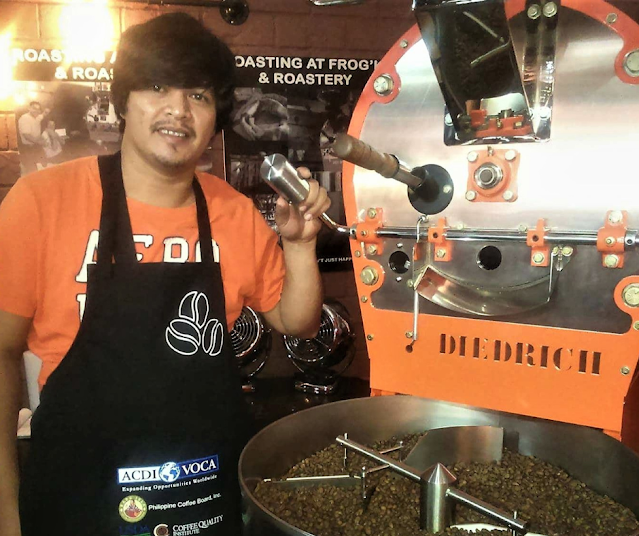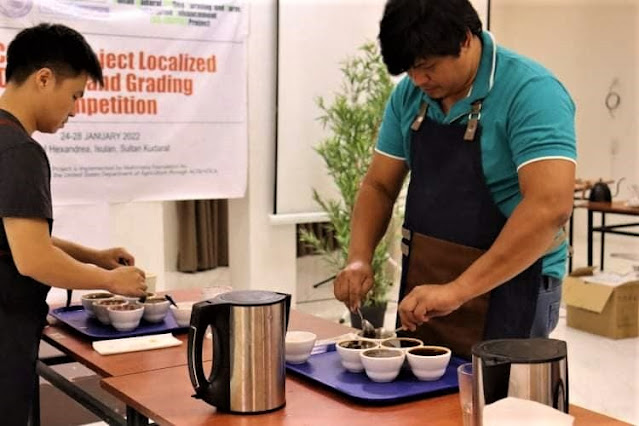Spreading awareness on local specialty coffee
Arnel Cadeliña thought that having a coffee roasting business that existed for eight decades would solidify him as a specialty coffee expert. But when he started to explore the Philippine coffee industry, particularly in Soccsksargen region, he could not resist to learn more.
“We have had a family coffee roasting business since 1941. It started from my grandmother in Kabacan, (North) Cotabato province. In 1973, when my father was in his 6th grade, his family migrated to GenSan and continued the business,” Cadeliña recalled.
Before, they used a traditional method of roasting coffee beans. His father Romeo used a kawa (huge cauldron) and heated the beans with fire wood. It was labor-intensive because it needed manpower to roast the (green) coffee beans.
In 2009, Cadeliña took over the business due to his father’s deteriorating health. That time, he started to think big for their family business. He took the initiative to formally register their roasting business to have a legal identity and named it as “Tay Roming Coffee Roasters” in honor of his late father.
“My father did not bother to register our roasting business. He was only focused on it and provided for the needs of his family,” he said.
In 2012, he collaborated with his brother Ronnel, to conceptualize and create their first coffee roasting machine. It went through research and development. It took almost a year to finish a decent roasting machine.
With this kind of innovation, it became the first specialty roaster machine in GenSan.
Cadeliña’s engagements with the Department of Trade and Industry (DTI) led him to many opportunities. Various training and seminars were provided to help him on his coffee journey.
The agency also linked him to different organizations such as ACDI/VOCA.
In 2017, he got the opportunity to participate in MinPact’s “Introduction to Coffee Roasting & Quality Control.” It was his first quality roasting training.
In 2018, he also participated in Coffee Quality Institute’s Robusta Grader training in Davao City.
“The training made me realize that my knowledge on specialty coffee was limited. I started to become curious and explored the industry. What I gained from this training I pay it forward,” he said.
“When I came back to GenSan, it still did not have a market for specialty coffee. Most of the consumers preferred commercial coffee,” he added.
Specialty coffee is primarily concerned with coffee quality, traceability and volume. Its sourcing is often associated with strong, direct relationships between the buyers and the producers.
Cadeliña continues his mission to advocate for specialty coffee. He often collaborates with like-minded individuals from the industry to help promote local coffee quality. He also considered Emeline “Mimi” Sabado as his coffee mentor as she encouraged Cadeliña to join different coffee trainings in the country.
At the height of the pandemic, there were pop-up coffee shops spread in GenSan. When Cadeliña visited these coffee shops, he discovered that most of them were misinformed about specialty coffee. They also patronized coffee beans that are imported from other parts of the country and even abroad.
“I discovered that GenSan has lots of coffee enthusiasts but they prefer outside coffee beans. My personal advocacy is to support our own local coffee industry,” he said.
“We are in the same industry but some of them are misinformed about coffee in general. There is a need to raise awareness on quality coffee. We really need to promote our local coffee industry in the region.”
As a Q Robusta Grader, Cadeliña took the initiative to teach these coffee shop owners and enthusiasts about specialty coffee. He collaborates with government agencies, such as DTI, Department of Agriculture and Department of Agrarian Reform, as well as coffee organizations, to help promote the importance of quality coffee and support the coffee value chain in the region.
As part of understanding what makes coffee great, the consumers must know where our coffee comes from and how it goes through the value chain. As known in the coffee industry, the value chain — from coffee trees to cup — goes through these five essential steps: 1) Coffee Production – Planting and harvesting coffee; 2) Processing – Drying and removing the seed from the coffee fruit; 3) Trading – Selling of beans from farmers to roasters; 4) Roasting – Transforming green coffee beans into flavorful coffee; and 5) Marketing – Selling directly to consumers.
He often visits different communities particularly in GenSan and Sarangani to share his knowledge on coffee.
“We need to highlight our local coffee farmers. It’s a bonus if we, the coffee Q Graders, would be recognized for our efforts,” he said.
Cadeliña have conducted various coffee trainings on post harvesting, processing, roasting and coffee cupping to different coffee farmers, coffee shop owners and enthusiasts. He was also one of the judges in the 2022 Philippine Coffee Quality Competition (PCQC) last March 18, 2022, in Davao City. It was participated in by 87 local coffee growers nationwide.
According to PCQC website, the event is “an annual green coffee competition that seeks to increase the consciousness of Filipino farmers on coffee quality and encourages them to improve their competitiveness in the domestic and international markets.”
“We really need to uplift the local coffee industry starting from the grassroots level. We need to support all sectors in the coffee value chain. It is good to see that their lives would improve because of coffee,” Cadeliña said.
Coffee is one of the 16 major priority industry clusters in Soccsksargen that are being supported by DTI-12 through its entrepreneurship and product development programs. In 2018, for example, it produced a total of 19,901 metric tons of Robusta coffee or 57 percent of the country’s total yield.
Aside from DTI-12, the Regional Development Council (RDC) of Region 12 is also assisting the promotion and expansion of the area’s coffee industry.
In 2020, the RDC-12 passed Resolution No. 103 requesting all regional line agencies and local government units to serve locally produced coffee during meetings and similar events.
But there are some problems that need to be addressed. As identified, the local coffee industry has often been vulnerable to erratic pricing and low supply.
Cadeliña is committed to continue spreading awareness through consumer education, empowering local coffee farmers, and sharing his coffee knowledge to as many people that are involved in the industry. Recently, he helped organize the GenSan Coffee Shops Association that could aid in strengthening the coffee value chain in the region.
“We should support and consume our local coffee. We make sure that we patronize coffee that passes industry’s quality standard, has good agricultural practices and values fair trade, as well as help empower communities. We need to raise consumer awareness to help support the coffee industry,” he said. (Originally published in SunStar Davao, dated June 21, 2022)






Comments
Post a Comment
The author encourages readers to post sensible comments in order to have meaningful discussions. Posting malicious, senseless and spam comments are highly discouraged.
Thank you for reading Yadu Karu's Blog.